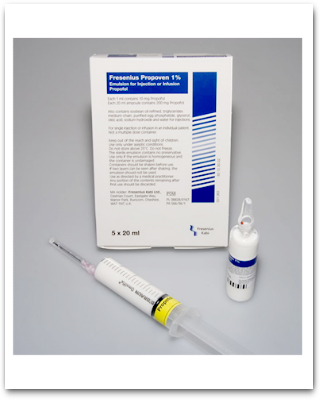Overview
Pharmacokinetics
Onset time: 30 seconds
Offset
time: 3-7 minuntes
Propofol may also be used by continuous
infusion to maintain anaesthesia.
Metabolism: Two pathways:
conjugated in the liver to the glucuronide and hydroxylated to the
quinol, which is subsequently glucuronidated.
Pharmacodynamics
CNS: Hypnosis.
Common side-effects
CVS: Direct myocardial
depression and reduction in SVR causing hypotension, but little change in
heart rate (bradycardia may occur) and reduction in cardiac output (CO).
Use with caution in the hypovolaemic patient.
RS: Dose-dependent
respiratory depression. Upper airway reflexes obtunded more than for
thiopental, allowing earlier placement of a laryngeal mask.
Other effects
Pain on injection, which can
be reduced by the use of lidocaine.
Nausea and vomiting is much
less likely after propofol than other agents.
Hypersensitivity
reactions: Approximately 1 in 100 000.
Relative contraindication to use
Not
licensed for children under three.
